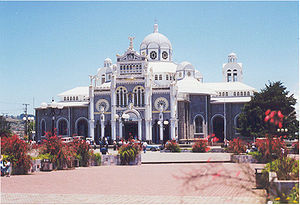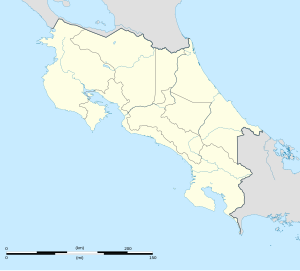Cartago, Costa Rica
| Cartago | |||
|---|---|---|---|
| City | |||

|
|||
|
|||
| Nickname(s): Ciudad de las Brumas (Spanish) " City of Fogs " |
|||
| Motto: Fide et pace (Latin) "Faith and Peace" |
|||
| Location in Costa Rica | |||
| Coordinates: 9°52′N 83°55′W / 9.867°N 83.917°WCoordinates: 9°52′N 83°55′W / 9.867°N 83.917°W | |||
| Country |
|
||
| Province | Cartago Province | ||
| Canton | Cartago Canton | ||
| Founded | 1563 | ||
| Capital City until | 1823 | ||
| Government | |||
| • Mayor | Lic. Rolando Rodríguez Brenes (PLN) | ||
| Area | |||
| • City | 152.68 km2 (58.95 sq mi) | ||
| Elevation | 1,435 m (4,707 ft) | ||
| Population (2008) | |||
| • City | 156,600(2) | ||
| • Metro | 413,505 (2) | ||
| Time zone | Central Standard Time (UTC-6) | ||
| Climate | Cwb | ||
| Patron saint | Saint James the Greater | ||
| Website | www.muni-carta.go.cr | ||
| HDI (2005) 0.813 – high | |||
Cartago (Spanish pronunciation: [kaɾˈtaɣo]) is a city in Costa Rica, about 25 km (16 mi) east of the capital, San José. It is at an elevation of about 1435 m (some 4,707 ft) above sea level, at the base of the Irazú Volcano. Cartago is the capital of Cartago province, and was the capital of Costa Rica from 1574 to 1824. The city covers an area of 152,68 km². It includes the districts of city downtown: Oriental, Occidental (known as the typical downtown area), San Nicolás (the main entrance to the city, at west), El Carmen (north), Dulce Nombre, San Francisco (at south, San Francisco is known commonly as Aguacaliente), and Guadalupe (Arenilla). The city is part, with the cities of San Rafael de Oreamuno and Tejar del Guarco, of a continuous urban area that, in 2008, had a population of 156,600 inhabitants, according to the Statistics and Census Institute of Costa Rica.
Founded in 1563 by Juan Vasquez de Coronado, it was the first successful establishment in Costa Rica. The city was granted a coat of arms by King Philip II of Spain in 1565, and the title of Muy Noble y Muy Leal ("Very Noble and Very Loyal") by the Cortes (Spanish Parliament) in 1814. It served as the first capital of Costa Rica until 1823, when Republican leader Gregorio Jose Ramirez, moved the capital to the bigger city of San José, because Cartago wanted to unite the newly independent province of Costa Rica to the Iturbide's Mexican Empire while San Jose and Alajuela supported a Republican system. The city was severely damaged by major earthquakes in 1822, 1841 and 1910. In 1963, a volcanic eruption of Irazu Volcano which for two years covered San José in ash badly damaged some agricultural areas around Cartago, but not the city.
Many pilgrims come to Cartago annually, to visit the nation's principal church, the enormous Basílica de Nuestra Señora de los Ángeles, on the feast day of the Virgin of the Angels (August 2). The church has a statue of a Black Madonna known as La Negrita, who supposedly had great healing powers. The sick come to her statue in hope of a miracle from La Negrita.
...
Wikipedia



